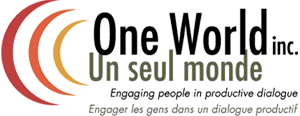Each Person Brings Something Different to the Table
 When we enter into any meeting, we are bringing with us our life and work experiences, our agendas, our biases, our hopes and our viewpoints about what should happen and how. This can create undercurrents that make it difficult for people to work productively or converse effectively. A goal of facilitation is to acknowledge these dynamics and create a safe space for individuals to exchange thoughts, ideas and learning.
When we enter into any meeting, we are bringing with us our life and work experiences, our agendas, our biases, our hopes and our viewpoints about what should happen and how. This can create undercurrents that make it difficult for people to work productively or converse effectively. A goal of facilitation is to acknowledge these dynamics and create a safe space for individuals to exchange thoughts, ideas and learning.
We all have “agendas” – the personal or professional reasons why we are attending a particular meeting. What is important, especially in a facilitation setting, is that we get these agendas out on the table so people know where others are coming from and have some understanding of why their points of view are expressed in a particular way. In creating a safe, collaborative space, we make it possible for these types of conversations to take place. The facilitator’s role is to design a process that creates the conditions for this to occur. Some considerations include:
- Providing access to key information in advance so that everyone shares some common understanding of the issues.
- Ensuring that the physical set-up of the meeting space facilitates discussion and engagement.
- Establishing appropriate ground rules at the start of meetings, such as respect, no personal attacks, confidentiality, etc.
- Structuring the agenda to include preliminary conversations that bring personal agendas to the surface while maintaining a focus on meeting objectives and desired outcomes.
- Monitoring how participants engage with each other, gently reminding them of the ground rules as needed.
- Paying attention to individual learning and participation styles, such as people who tend to dominate, or those who need encouragement to express their ideas, or others or who need to be able to move around in order to be engaged.
By developing and maintaining a space in which people feel safe and their comments respected, facilitators create a welcoming environment. This approach supports good conversations and learning from one another. Such dialogue makes it possible for organizations to effectively engage and learn from the knowledge, experiences and agendas of their staff, volunteers, members and communities.
